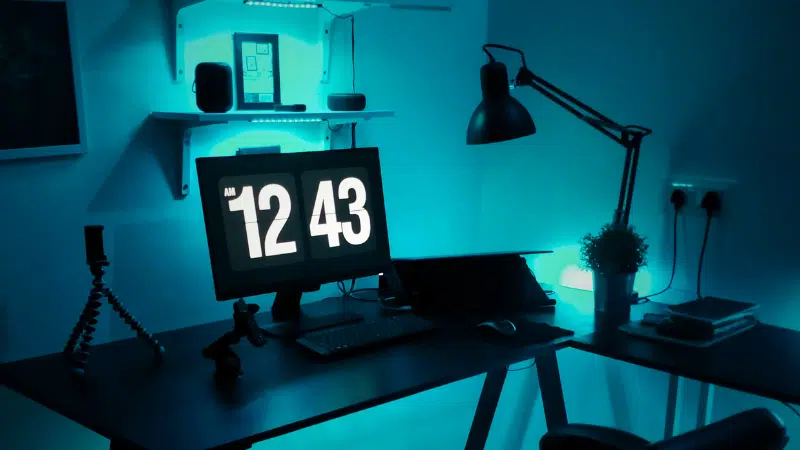Poor time management will make your life harder, no matter your industry. As an independent musician, you already have to wear many different hats. From recording and performing to writing and social media posting, everything falls onto you to manage accordingly. However, what tends to fall to the wayside are thoughtful planning, time management, and avid recovery time to be your best and avoid burnout. In this post, we’ll give you some tried and true time management tips to help you reduce stress and be your best self. Here’s the rundown…
Time Management Tips To Reduce Stress as a Musician
Stick To a Schedule
Without a clear schedule, it’s easy to become overwhelmed by the sheer number of things that need to get done. By creating a daily or weekly schedule, you can prioritize your most important tasks, ensuring that you allocate the right amount of time to each. This structured approach not only helps you stay on track but also eliminates the anxiety that comes from trying to juggle too many things at once.
Not only that but sticking to a schedule will also help you maintain a healthy work-life balance. By setting aside specific times for work-related activities and personal life, you can ensure that you’re not overworking yourself or neglecting important aspects of your life outside of music. This balance reduces the risk of burnout and gives you a chance to recharge, making you more productive and creative when it’s time to work on your music.
Set Better Goals
The kind of goals you set for yourself can either make or break your results in itself. If you shoot too high, you’ll be overwhelmed and overworked just for the goal to never be met, and for you to be disappointed. Regarding your music career, your goals need to be realistic and specific. You should be able to quantifiably measure their success. For them to be achievable for you as an artist, you also need to be able to give it a set time period for it to be accomplished by.
When it comes to goal setting, many pros around the world use the S.M.A.R.T method, which was built to help you create specific criteria for your goals to improve the chances of their success. (We actually did an article about this last year which goes into full detail. Check that out right here.)
Break Large Projects Into Smaller Chunks
Large projects like recording an album or planning a tour can be overwhelming if you sit down with the entire task in front of you at once. On the other hand, the first step on its own isn’t so daunting. Neither is step two after that. Break your large projects down into smaller, more manageable tasks and tackle them one at a time. Not only does this make it easier to track your progress as you go, but you’ll stay motivated, more clear-headed, and stress-free until the very end.
Set a Time Limit for Each Task
When we sit down in front of a task with the intention of finishing it in the same sitting, we place unnecessary pressure on ourselves to do just that. When you set 15 minutes on the timer for a portion of the task, you know that when that 15 minutes is up, you can sit back, relax, and take a breather. It doesn’t mean you need to be completely finished, and this relieves that unnecessary sense of urgency. Not only that, but taking your time and giving yourself breaks gives your brain a much-needed reset to come back to the task at hand with newfound creativity and clarity.
As cited by the American Psychological Association’s (APA) feature on boosting productivity by Psychological researcher Larry Rosen, Ph.D, he suggests that people reward themselves with a few minutes of checking their phones or messages after just 15 minutes of uninterrupted work. While 15 minutes doesn’t seem like much, Rosen says, “Once you learn how to work for 15 minutes, start increasing the time before taking a technology break.”
If 15 minutes isn’t quite enough, another popular method is The Pomodoro Technique. This technique utilizes similar fixed time intervals for focused work, but for 25 minutes, followed by short breaks. This structured approach keeps the mind alert and engaged, while also preventing mental fatigue and encouraging a more productive, relaxed work session.
——
Don’t miss these helpful goodies… 🍬
10 Productivity Tools For Independent Musicians
How to Tap Into Creativity When You Have Writers Block
Useful Social Media Management Tools for Musicians in 2024
8 Things Musicians Should Be Investing Money In
——
Put. The. Phone. Down.
(and nobody gets hurt…)
Research shows it takes 23 minutes to regain your focus after a distraction. And one of the biggest distractions most of us just can’t seem to escape is our beloved phone. That means the more peeks you take at your pocket computer, the less time your brain is focused on real work. Every time you pick up that phone, you’ll need 23 minutes (at least) to truly get back into the flow of what you were doing. So, if you only set yourself an hour (or 25 minutes with the Pomodoro Technique) to focus on songwriting, half of that precious time is lost because you just HAD to watch that dumb TikTok of a guy dropping marbles down the stairs.
Personally, the only way I can completely avoid my phone is by putting it on ‘Do Not Disturb’ and setting a timer for however long I need to focus. That way, there’s nothing to take me out of my zone, and I don’t even have to check the time to see how much longer I’ve got.
Schedule Time for Rest
Taking time to decompress is just as important as everything else on your massive list of to-do’s. I understand the guilt that can come from taking a break. Especially as creatives, we tend to correlate rest with being lazy or unmotivated. However, it is so the contrary. Treat rest as a part of the process. Without it, you can’t do everything else at your highest potential. This, in my opinion, is the key to stress management no matter what industry you’re in.
In today’s hustle culture, we’re taught to grind every second of every day, to push ourselves to our limits, to block out anything that isn’t work-related, and to “lock in” despite any and all pressure. And all that… is bullshit.
You know what does make shit happen? A clear mind. A good night’s rest. A healthy work-life balance. Above all else, I hope this article encourages you to prioritize your peace. Not only that, I hope it encourages you to implement strategies in your life to help your efforts work with you, not against you. — The greatest art comes from a place of balance and clarity. So take a breath, take a break, and trust that rest isn’t just a pause; it’s fuel for your creativity.
Keep your head up, your schedule steady, and watch your career (and your well-being) thrive.
🌱



